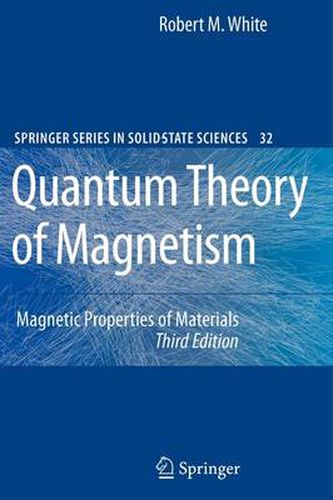Readings Newsletter
Become a Readings Member to make your shopping experience even easier.
Sign in or sign up for free!
You’re not far away from qualifying for FREE standard shipping within Australia
You’ve qualified for FREE standard shipping within Australia
The cart is loading…






This title is printed to order. This book may have been self-published. If so, we cannot guarantee the quality of the content. In the main most books will have gone through the editing process however some may not. We therefore suggest that you be aware of this before ordering this book. If in doubt check either the author or publisher’s details as we are unable to accept any returns unless they are faulty. Please contact us if you have any questions.
Quantum Theory of Magnetism is the only book that deals with the phenomenon of magnetism from the point of view of linear response . That is, how does a magnetic material respond when excited by a magnetic field? That field may be uniform, or spatially varying, static or time dependent. Previous editions have dealt primarily with the magnetic response. This edition incorporates the resistive response of magnetic materials as well. It also includes problems to test the reader’s (or student’s) comprehension. The rationale for a book on magnetism is as valid today as it was when the first two editions of Quantum Theory of Magnetism were published. Magnetic phenomena continue to be discovered with deep scientific implications and novel applications. Since the Second Edition, for example, Giant Magneto Resistance (GMR) was discovered and the new field of spintronics is currently expanding. Not only do these phenomena rely on the concepts presented in this book, but magnetic properties are often an important clue to our understanding of new materials (e.g., high-temperature superconductors). Their magnetic properties, studied by susceptibility measurements, nuclear magnetic resonance, neutron scattering, etc. have provided insight to the superconductivity state.This updated edition offers revised emphasis on some material as a result of recent developments and includes new material, such as an entire chapter on thin film magnetic multilayers. Researchers and students once again have access to an up-to-date classic reference on magnetism, the key characteristic of many modern materials.
$9.00 standard shipping within Australia
FREE standard shipping within Australia for orders over $100.00
Express & International shipping calculated at checkout
This title is printed to order. This book may have been self-published. If so, we cannot guarantee the quality of the content. In the main most books will have gone through the editing process however some may not. We therefore suggest that you be aware of this before ordering this book. If in doubt check either the author or publisher’s details as we are unable to accept any returns unless they are faulty. Please contact us if you have any questions.
Quantum Theory of Magnetism is the only book that deals with the phenomenon of magnetism from the point of view of linear response . That is, how does a magnetic material respond when excited by a magnetic field? That field may be uniform, or spatially varying, static or time dependent. Previous editions have dealt primarily with the magnetic response. This edition incorporates the resistive response of magnetic materials as well. It also includes problems to test the reader’s (or student’s) comprehension. The rationale for a book on magnetism is as valid today as it was when the first two editions of Quantum Theory of Magnetism were published. Magnetic phenomena continue to be discovered with deep scientific implications and novel applications. Since the Second Edition, for example, Giant Magneto Resistance (GMR) was discovered and the new field of spintronics is currently expanding. Not only do these phenomena rely on the concepts presented in this book, but magnetic properties are often an important clue to our understanding of new materials (e.g., high-temperature superconductors). Their magnetic properties, studied by susceptibility measurements, nuclear magnetic resonance, neutron scattering, etc. have provided insight to the superconductivity state.This updated edition offers revised emphasis on some material as a result of recent developments and includes new material, such as an entire chapter on thin film magnetic multilayers. Researchers and students once again have access to an up-to-date classic reference on magnetism, the key characteristic of many modern materials.